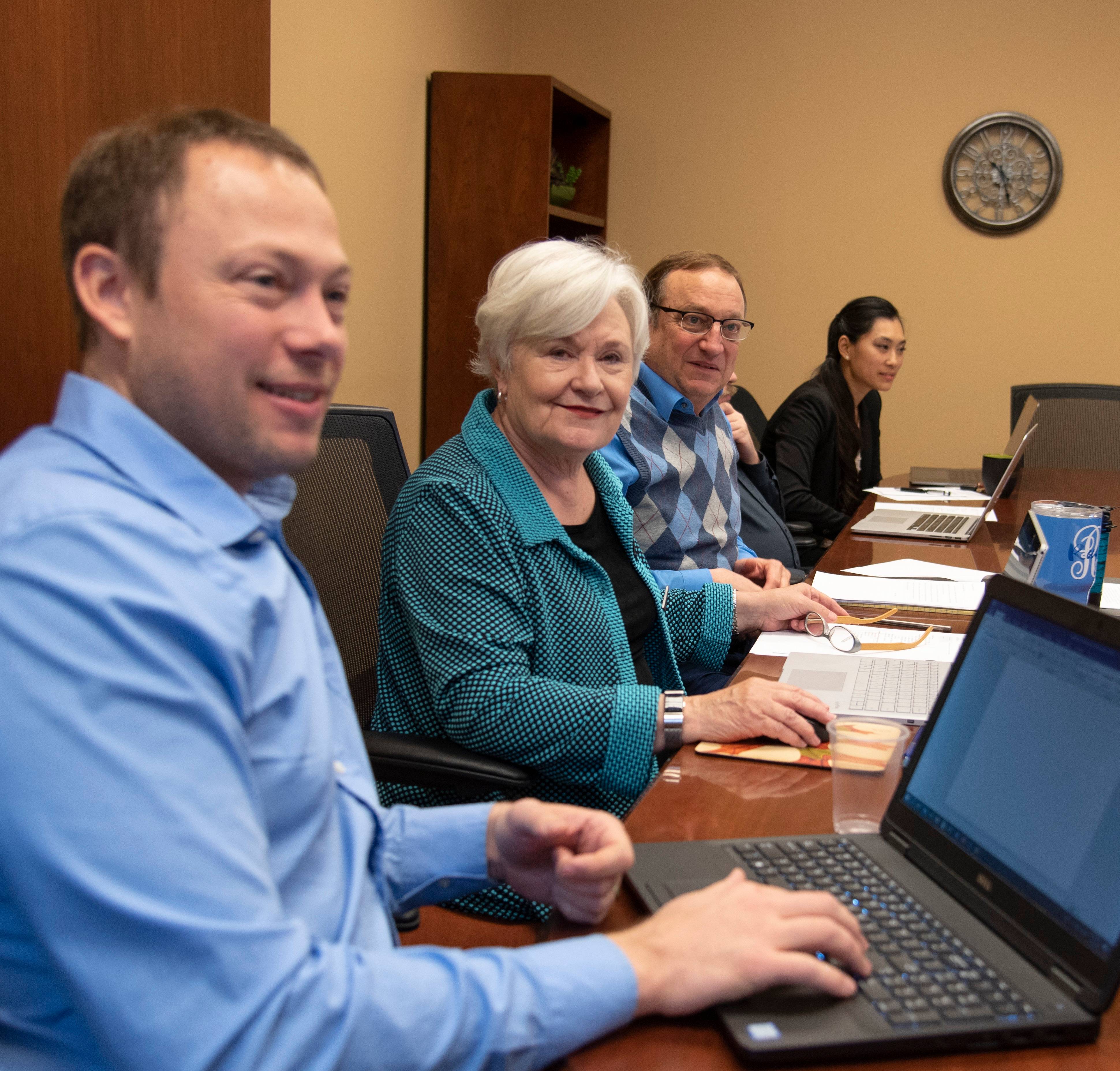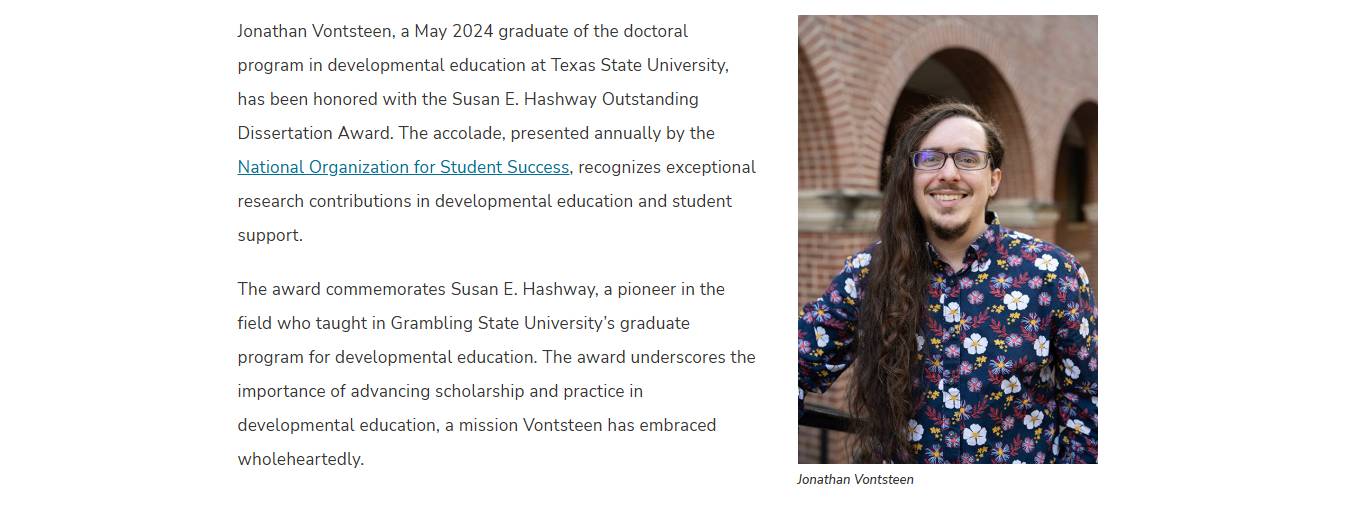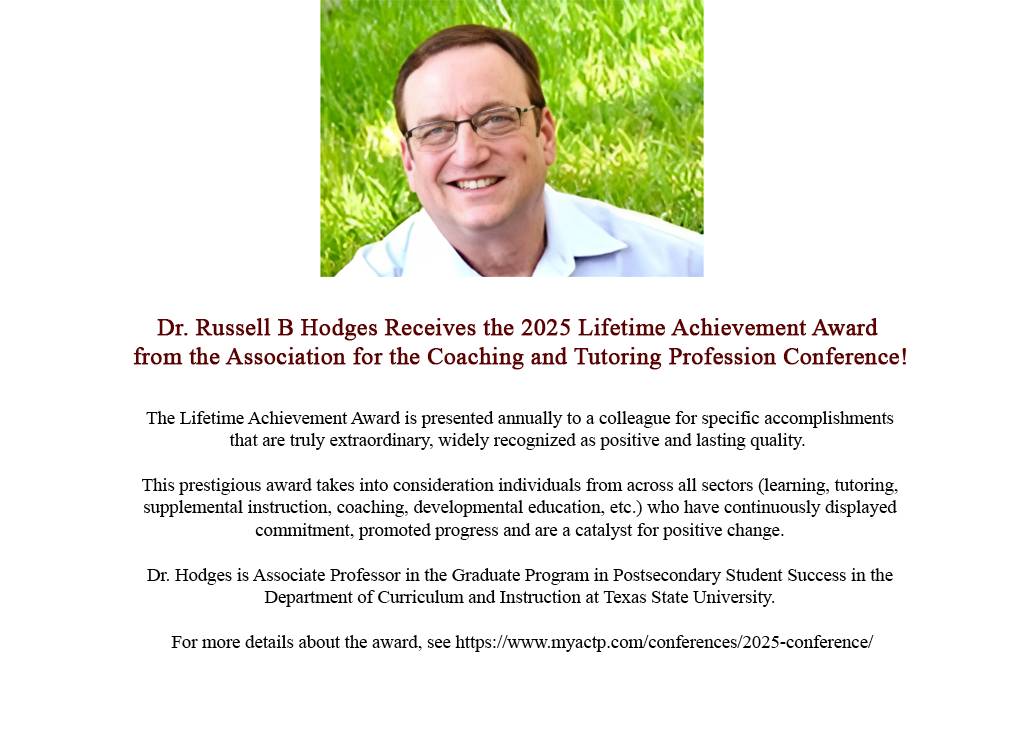Doctoral Program in Postsecondary Student Success in Learning, Literacy, and Mathematics
The Department of Curriculum and Instruction at Texas State University offers two doctoral degrees in Postsecondary Student Success in Learning, Literacy, and Mathematics (formally Developmental Education): a PhD that will produce researchers, university faculty, and scholars who will build a strong research and theoretical base for postsecondary student success and an EdD that will produce highly qualified program leaders and practitioners in postsecondary student success. As the first PhD and EdD in postsecondary student success in the country, the program will fill an urgent need for advanced research in a rapidly expanding field aimed at holistically serving students and supporting their academic success in postsecondary educational contexts.
-
Welcome
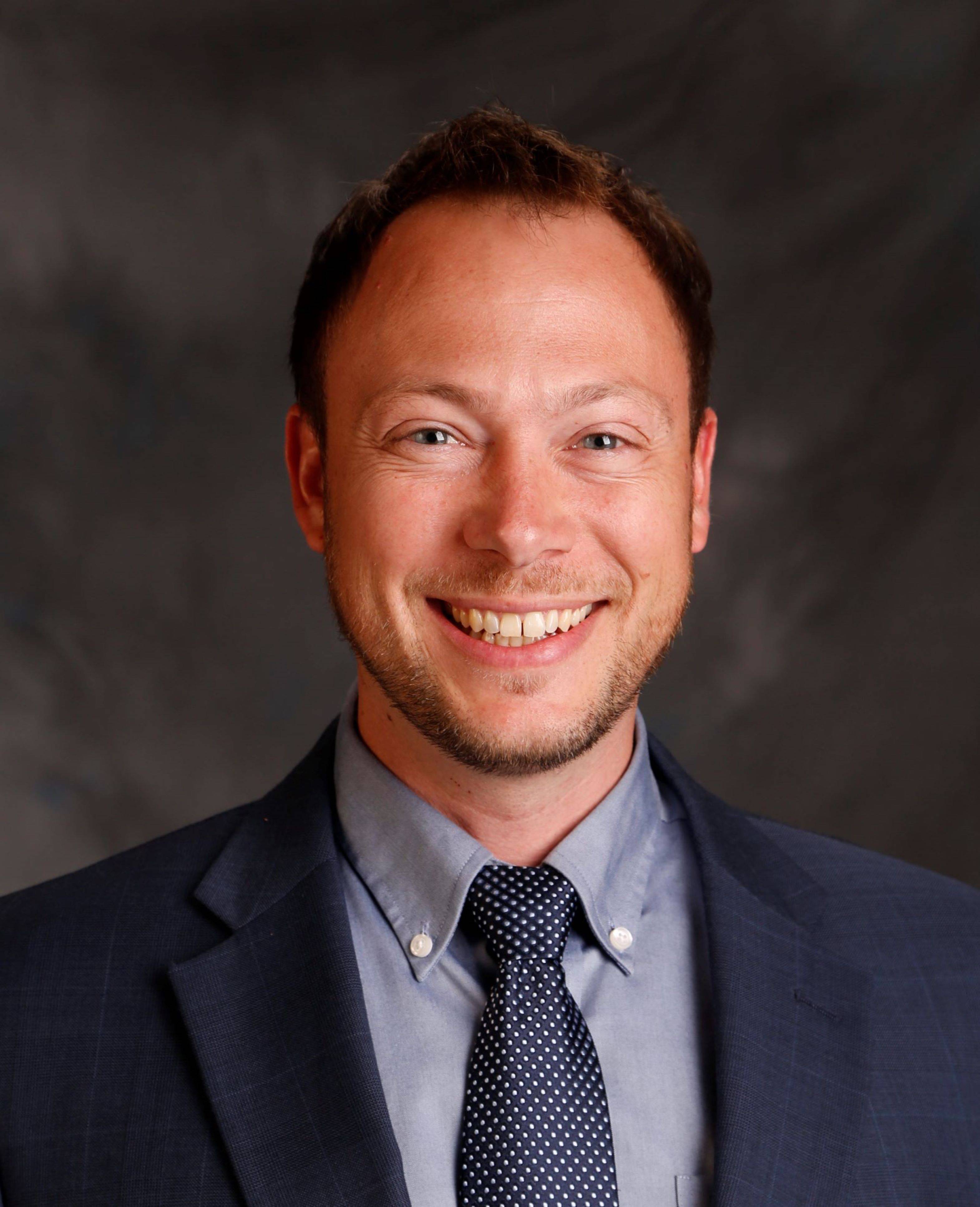
Dr. Taylor Acee
Doctoral Program DirectorWelcome to the official website of the Doctoral Program in Postsecondary Student Success in Learning, Literacy, and Mathematics. We appreciate your interest in our program and the field of postsecondary student success research, policy, and practice. Our Graduate Program offers M.A., Ed.D., and Ph.D. degrees. We also offer a graduate minor. This website is specific to our doctoral program.
This website contains detailed information for current and prospective students. As you explore our degree plans and funding opportunities, we also hope you will become more familiar with our community of graduate students, staff, and faculty, and the research and educational initiatives in which we are involved.
Should you have any questions or need more information, please contact me directly.
Sincerely,
Taylor W. Acee, Ph.D.
Professor and Doctoral Program Coordinator
Email: ta19@txstate.edu
Office Phone: 512.245.7903
-
What is Postsecondary Student Success?
Postsecondary Student Success is an area of research, policy, and practice focused on understanding, generating scholarly knowledge about, and equitably improving student experiences and outcomes in 2-year and 4-year colleges, universities, certificate programs, vocational and technical schools, and college-transition programs. Postsecondary student success includes, but is not limited to, student academic goal progress and attainment; successful transitions into and out of postsecondary contexts; progress in learning, literacy, and mathematics; academic coursework outcomes; student engagement, persistence, retention, transfer, and completion; and student wellbeing. Our program places special emphasis on holistic student support and success in three concentration areas related to postsecondary learning, literacy, and mathematics. Traditional areas of the field have included course-based aspects of academic and transition support, such as developmental reading, basic writing, developmental mathematics, co-requisite models, study skills, first-year experience (or seminar), college success, and learning-to-learn (or learning frameworks) courses, as well as non-course-based aspects of support like tutoring, supplemental instruction, academic coaching, mentoring, early-alert systems and support, and integrated institutional initiatives to support student success. Postsecondary student success has a multidimensional and transdisciplinary focus that is concerned with student issues of cognition, metacognition, motivation, affect, identity, culture, development of literacy and mathematical skills, and various aspects of postsecondary contexts and students’ lived experiences. It is also concerned with postsecondary personnel, institutions, and policies and social systems related to and affecting student success.
The field of postsecondary student success and our graduate program concerns and has roots in developmental education (our former degree title). As nomenclature in the field has shifted from developmental education to student success, we modified our program name and degree titles to emphasize our focus on student success, while still working under the same mission.
Below is a list of several key professional organizations related to the fields in and around Postsecondary Student Success:
- National Organization for Student Success (NOSS) (formally National Association of Developmental Education)
- College Reading and Learning Association (CRLA)
- National College Learning Center Association (NCLCA)
- Association of Colleges for Tutoring and Learning Assistance (ACTLA)
- Association for the Coaching and Tutoring Profession (ATP)
- Council of Learning Assistance and Developmental Education Associations (CLADEA)
- Council for the Study of Community Colleges (CSCC)
Also, below are a few other professional organizations related to educational research that have connections to postsecondary teaching and learning that may be of interest:
- American Educational Research Association (AERA)
- Literacy Research Association (LRA)
- American Mathematical Association of Two-Year Colleges
Finally, below are links to recent U.S. Programs and Proposed Acts related to Postsecondary Student Success:
-
Prospective Students
Applicants for the doctoral program are interested in the field of postsecondary student success and are especially interested in doctoral study within concentration areas related to learning, literacy, and/or mathematics. Some applicants are currently working in the field of postsecondary student success, developmental education, or a related area, and some applicants are interested in transitioning into the field of postsecondary student success and bring relevant work, volunteer, and/or educational experiences and interests related to our program. Each student's degree plan will be designed by the student in consultation with the doctoral program director and program faculty, during the first year of study. Degree plans depend on each student's academic preparation, scholarly accomplishments, experience, and professional goals. This process creates a highly flexible and personalized degree that also ensures strong preparation for graduates to address pressing needs of this important field.
-
Our Mission
The Doctoral program in Postsecondary Student Success in Learning, Literacy, and Mathematics within the Department of Curriculum and Instruction prepares future scholars, researchers, leaders, administrators, instructors, and practitioners in the field of postsecondary student success. Both rigorous and supportive, the program aims to advance theory, research, and practice in multiple areas of postsecondary student success — including learning, literacy, mathematics — by actively engaging students in teaching, scholarship, and professional service. As a multidisciplinary program, the faculty, staff, and students work collaboratively across various academic disciplines, diverse communities, and geographic boundaries.
-
Programmatic Elements
Two degree tracks: PhD and EdD.
Three concentration areas: Developmental Literacy, Developmental Mathematics, and Learning Support.
Core coursework and degree requirements focus on theory, research, practice, policy, research methods, and professional development related to postsecondary student success in learning, literacy, and mathematics.
-
Educational Objectives
Preparing future postsecondary student success scholars and practitioners who engage in divergent and critical thinking and reflective research and practice, are culturally competent, and are skilled in maximizing technology applications related to postsecondary student success in learning, literacy, and mathematics.
Preparing postsecondary student success professionals who understand and can respond to the nature and need of students enrolled in postsecondary and college-readiness contexts; the complexities of motivation, teaching, learning, and assessment in postsecondary student success settings; and the political, cultural and social systems that create inequities in educational settings.
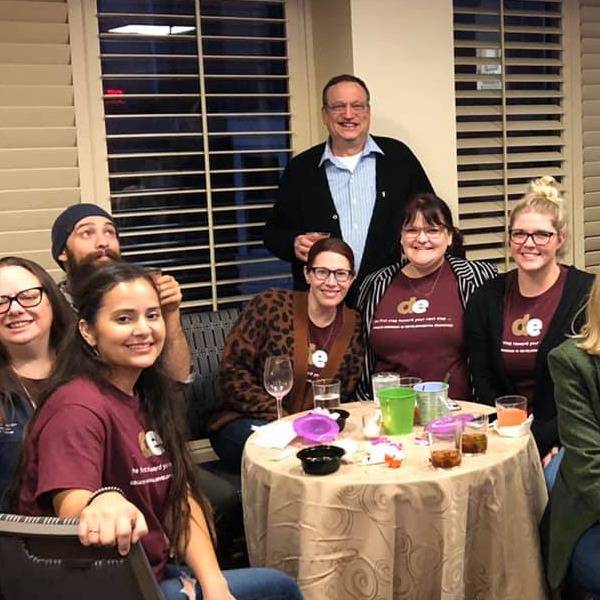
Current Students
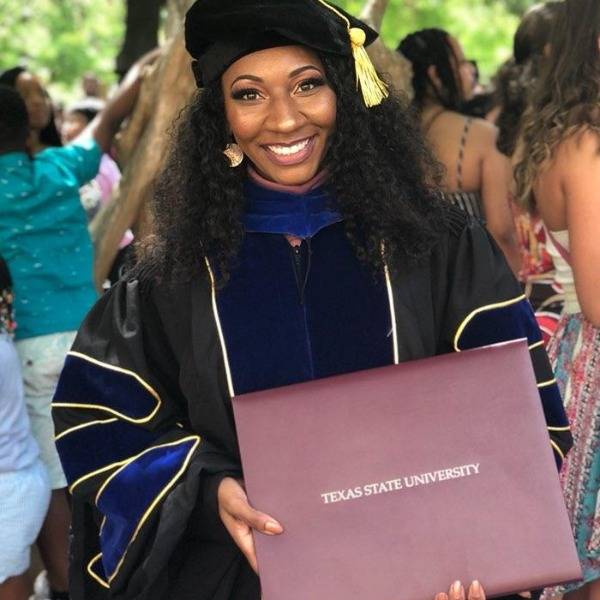
Prospective Students
